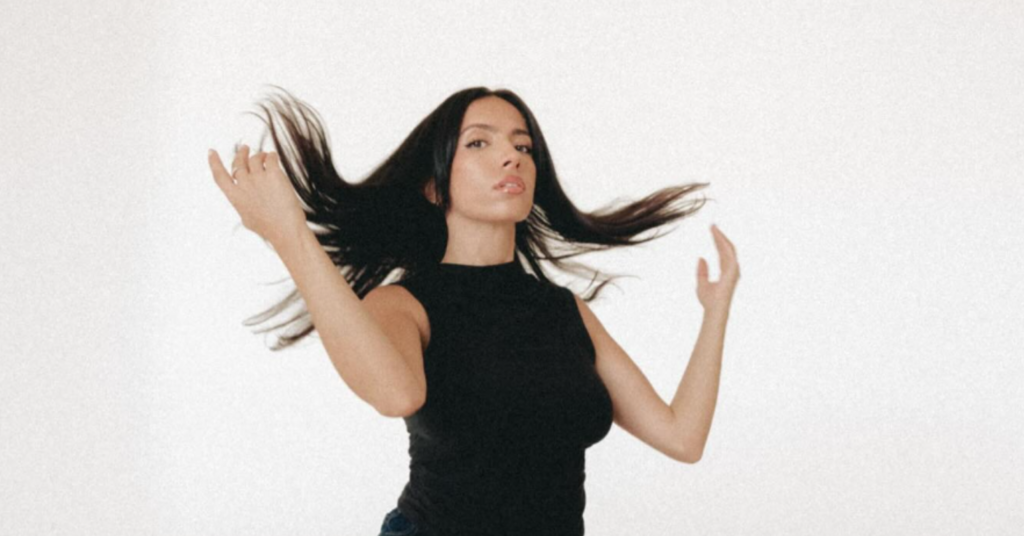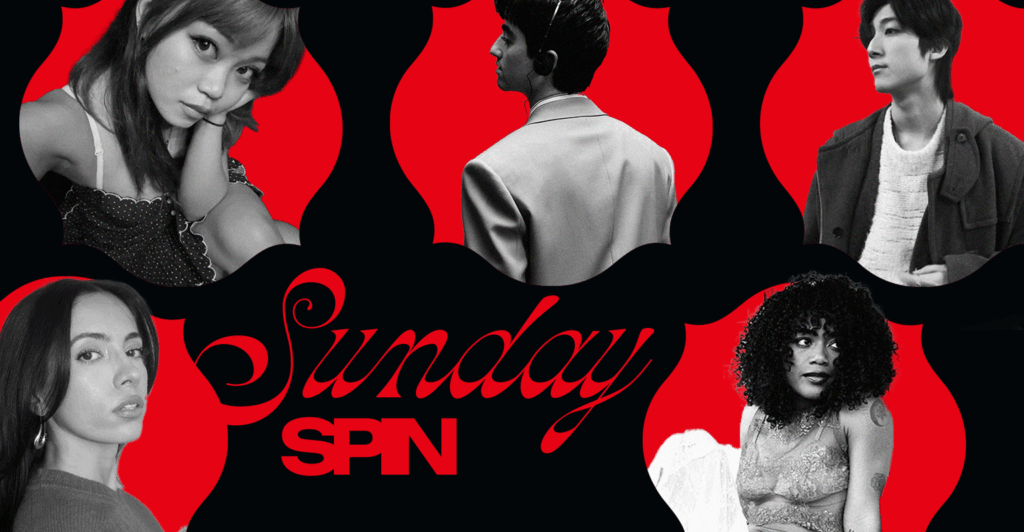
Like many American-born children of immigrants, Persian singer-songwriter Neena Roe seeks to transcend borders and generations with her craft. Rich with lush melodies and earthy instrumentals, her growing discography explores themes of introspection, ancestral longing, and solitude.
With nearly 50,000 followers across socials, Neena is a star on the rise among diasporic artists chasing their wildest dreams. She has premiered on Apple Music’s Beats1 Radio and received placements on Tidal’s Pop Rising Playlist. However, she told EnVi that one of her proudest accomplishments is gracing the cover of The Persian Magazine’s inaugural issue. According to TPM writer Hossein Filizadeh, Neena was selected for “her unique qualities and remarkable distinction from other Iranian musicians.” From Detroit’s east side to Iran’s arts and culture scene, her creative journey has been nothing short of evolutionary.
As daylight filled a cozy East Williamsburg studio, Neena sat down with EnVi to unpack her debut EP how to be alone, her creative process, and the dualities of diasporic identity.



Embracing the “In-Betweens” of culture and creation
Born in the midwest to Iranian refugees, Neena learned the complexities of cultural identity at a young age. In a community where fellow Iranians were few to none, Neena grappled with an unstable sense of belonging. As a child, there was “nothing [she] wanted more than to fit in.” Existing within the “in-between” of identities — as neither Iranian by birth nor American by appearance — felt isolating.
“In many people’s psyche, an American is a European, white-presenting person. I was born in America, but I don’t fit people’s idea of what an American is. I’m ethnically Iranian, but I’ve never even stepped foot in Iran. I feel like the dash (-) separating Iranian-American,” Neena said.
As time passed, it became the core of her musical identity. “I’m a daughter of so many different communities,” she reflected. “Music takes all of those pieces and brings them together in a very authentic way.”

Still, embodying that authenticity through sound did not come easily at first. Indie trailblazers like Fiona Apple, Alanis Morissette, and Mazzy Star served as inspirations, but Neena could not entirely see herself as part of a genre dominated by white artists. “I used to think, ‘I can’t be indie because I don’t look like them. I don’t have the life experience that they have,’” she explained. As a result, she felt inclined to lean towards a “pop mentality” at the beginning of her musical journey. However, her lifelong love for language guided her through the push-and-pull of choosing between genres.
”Growing up, my grandfather had a lot of poetry memorized, so he would always recite Persian poetry to us in old Farsi,” she recounted warmly. “And Farsi is such a poetic language. When you say ‘I miss you,’ you say, ‘There’s a tightness in my heart when I think of you.’ That has informed the way I write my music now.”
This past March, Neena’s rendition of “boris az yadam” launched across streaming platforms — her first release entirely in Farsi. She expressed her love for language, believing that “one of the biggest blessings in [her] life” is her ability to speak English, Farsi, and Spanish. Multilingualism has opened doors to ideas and connections that she may have otherwise missed out on: “I think communication helps to bridge differences, which leads to love, compassion and empathy.”
Works of fiction have inspired Neena’s songwriting as well, especially The Invisible Life of Addie LaRue. “That book accompanied me through a very lonely moment, probably the loneliest moment that I’ve ever experienced. The way that authors write is very inspiring, and whenever I’m reading the most fiction, I feel like I write music better,” she said. With her debut EP how to be alone, she hopes for it to be a similar comfort for listeners.



“how to be alone” According to Neena Roe
Released on December 13, how to be alone is all about capturing “the world within us.” Regarding the inspiration behind the title, Neena unpacked her experiences learning to grow in solitude. At 17 years old, she moved out of her parents’ home for the first time. Since then, she has faced many situations where she had to “completely adapt and write [her] story from scratch.”
“I also haven’t been in a ton of romantic relationships, so I haven’t always had a partner to walk me through things,” she continued. “I have a million long-distance friendships, [and] that’s the reality of this remote world that we live in. It can be beautiful, scary, and heartbreaking.”
Through her new EP, Neena hopes to resonate with listeners who have lived through days where even just picking up the phone was a burden. “This project is meant to help people explore what [solitude] means for themselves. To process through those rough terrains that feel uncomfortable…to accompany them along the way.”

One standout track in how to be alone is “heaven & hell,” which was produced in a makeshift studio at a cabin in the woods. Created alongside her friends Kaleb and Jay — a producer and guitarist, respectively — the track “perfectly captures” the bittersweet essence of the EP. Smiling with nostalgia, Neena recalled the traces of their memories imbued into the song. She gestured with her hands as she remembered each detail, from the “clicks of the seat” that Jay sat on to the “sounds of the cabin” caught in the recording. They aimed to not only immerse listeners within that very space, but also encapsulate their inner world. “Inside of your head, it’s loud and chaotic. You’re by yourself, but there’s so much happening within you,” she said.
Another notable track is “broken!,” whose poignant melody is grounded in rugged instrumentals. With lyrics like “I wish that I could give a little more of myself / but maybe it’s my chance to set me free,” Neena explores an honest, but forgiving perspective on solitude. Rather than portraying it as loneliness, she meditates on momentary seclusion as part of the healing journey. Following a powerful electric guitar solo, which Neena considers one of the most “memorable” moments in how to be alone, “broken!” closes with group singing and laughter. This signifies the song’s speaker returning to their support system, who readily accepts them with open arms.
Building Community and Nourishing Souls
In Neena’s eyes, music is more than an art form. It is also a means of connection across seas and borders.
“I can’t even imagine what it would mean to be in a place that is fully Farsi-speaking,” she shared. “To visit the places that my mom and dad have told me a million stories about. To walk and feel that gravel under my feet…and the air is different. What would it feel like to taste and smell that air?”

Leading up to the release of how to be alone, Neena organized an intimate, Persian-inspired brunch and concert on December 8. Centered around the phrase nooshé jān, which roughly translates to “may it nourish your soul” in English, she hopes to “create community amongst Iranian creatives and the Middle Eastern community at large.” The event will feature Persian trio Dīvān, along with DJs Nick AM and Athena.
This labor of love is not only ripe for “human-to-human connection,” but also was informed by Neena’s interest in creating something beautiful from postcolonial grief. She described it as an “unfathomable” loss that “only children in the diaspora can feel,” especially those who have been displaced. “We’ve created these borders that are separating families and separating people from their roots,” she explained. “I try to turn that into something that helps people who feel like me connect back to whatever it is that they’ve been separated from.”

Looking Ahead
As for what follows how to be alone, Neena is experimenting with ways to diversify her sonic palette and “set [her] sound free.” Part of that is incorporating microtones — notes that sit between the standard piano scale. Applying this technique is also intricately tied to her intention to make art integrating “the cultures that created [her].” In both a musical and metaphorical sense, the in-betweens are Neena’s creative playground.
“Persian music, Arabic music, and even some Spanish music use microtones. Spanish music had some Middle Eastern influences because of the inquisitions in Spain, so you hear Arabic scales, which are also similar to Persian scales,” she explained. “When I’m singing in Spanish, it’s easier for me to take it into those sonic spaces. It adds something that’s unfamiliar to the broader American market, and I think people are fascinated by what’s different.”

Listeners can expect Neena’s future projects to “encompass [her] in the most holistic way, more than anything that [she] made in the past.” While her previous songs have represented different parts of her, she sees what comes next as close to “everything.”
Reflecting on her journey so far, Neena cited the importance of releasing control over outcomes.
”Decide what you want to do, but don’t force it to look a certain way. I never thought in a million years I would put out a song in Farsi, ever. I resisted for so long because of my own insecurities and fears, but I did it, and it opened up my world,” she explained. “Walk in the unfolding path that your heart is connected to, but always maintain a detachment from the exact outcome. It’s okay to manifest, but if you’re so fixated on it looking a certain way, you’re missing everything in your peripherals.”



How to be alone is out now on Spotify and Apple Music. To keep up with all things Neena Roe, follow her on Instagram and TikTok!
Interested in more EnVi exclusives? Check out our recent interview with K-pop group Big Ocean here!



